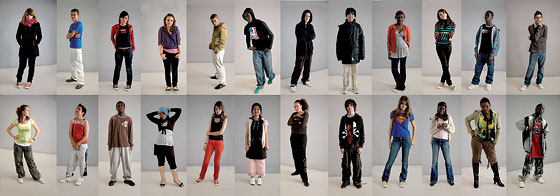
In Laurent Cantet’s edgy, semi-improvised drama The Class, real-life high-school teacher François Bégaudeau plays a version of himself, a teacher at a Paris high school in a poor neighborhood, and every class he leads is a juggling act that’s deeply disillusioning—then inspiring—then frustrating to the point of despair—then unexpectedly touching—then a god-awful mess. I’d hate to have to diagram it.
Okay, let me try: Bégaudeau writes on the blackboard and behind him a student fixes on a word—half out of curiosity, half to insolently break his teacher’s train of thought—and makes him stop and define it. The trim, buoyant Bégaudeau is an idealist who refuses to be swayed from his appointed task, and instead of expressing annoyance he patiently answers questions, tugging his pupils back to the lesson at hand. He finally does get a rhythm going, back and forth, and then an especially surly student interrupts to ask if it’s true what they say in the yard, that Bégaudeau likes men. And so the teacher has to set aside his plan and say, first, “What would be wrong with that?” and then no, it isn’t true—and by then the lesson has been derailed and there are snickers all around. Later, when Bégaudeau arrives at the faculty lounge, several of his colleagues appear shell-shocked, ready to pack it in: These kids don’t deserve to be educated; they’re like animals in heat; let them rot in their dead-end low-class jobs. Somehow Bégaudeau maintains his equilibrium, even when asserting his authority and reprimanding his students for their disrespect; he argues that a teacher’s job is “to bring kids out.” And he does—until, about an hour and a half into the movie, he’s upended and it all goes to hell.
The Class is just over two hours, but feels even longer because Cantet shoots the classes in something like real time; there’s no relief from the ticking clock and the need to engage, engage, engage these kids to keep chaos at bay. There are some white students, but most are children of immigrants from Africa, Asia, and the Middle East, many with parents who can barely speak French. They trade racist insults and argue over football teams, and Bégaudeau tries to mediate—but he’s a white male authority figure from a more prosperous class, and when he presses them too hard on, say, a point of grammar, his pupils parrot Marxist maxims and maintain that he can never understand their perspectives. They’re not entirely wrong, but Bégaudeau at least keeps at it. What finally rouses his students is an assignment to write self-portraits. Suddenly out pour their hopes and fears—about their bodies, their families, their struggles to adapt in a country that hasn’t made them welcome. For a brief spell, they seem younger, more open, and ready to learn.
The young actors who play students (many use their own first names) clearly enjoy the spotlight, and it might be that some of them are insufficiently apathetic—too on. But they sure seemed real to me, as real as the subjects in a Frederick Wiseman documentary. You see them through Bégaudeau’s eyes, as destabilizing forces, but you also recognize their too-ready defenses, their terror of losing face in front of their peers. The only one who made me want to sock her in the kisser (sorry, that’s why I’m not a high-school teacher) was Esmeralda, who meets every request with an anti-authoritarian sneer, and righteously stirs up discord. It’s Esmeralda who finally breaks Bégaudeau, who prompts his transformation from a liberal defender of an unruly African student named Souleymane into an obstinate authoritarian. The scene, before the school system’s disciplinary committee, in which the proud, taciturn teen must translate his African mother’s pleas to forgive her son, is a coup de théâtre—ironic, terrible, heartrending. Souleymane is at once defiant and scared, sunk into himself, and the only teacher with a hope of easing him to the surface is now his worst enemy.
It can be argued that Cantet condescends toward underclass immigrant kids, and that The Class—which is based on a memoir by Bégaudeau that will be published in English in the spring—can be used to justify the system’s failures. It’s true that the movie’s few industrious students are upstaged by their obnoxiously oppositional classmates, and that the movie ends on a bitter note that feels especially so one week after the inauguration of the first African-American president of the United States. Now that anything is possible, everyone of every race will be inspired to study hard—right? But I think it’s more important than ever to see—and to brood on—The Class. The threats to liberalism don’t just come from without, from the racists and reactionaries. They’re also from within, when do-gooders’ ideals are tested by the real world, when the underprivileged don’t show gratitude the way they do on TV shows. Cantet’s real-time classroom scenes are revelations: They make you understand that teaching is moment to moment, an endless series of negotiations that hang on intangibles—on imagination and empathy and the struggle to stay centered. This is a remarkable movie.
The Class
Directed by Laurent Cantet.
Sony Pictures Classics. PG-13.
E-mail: [email protected].
